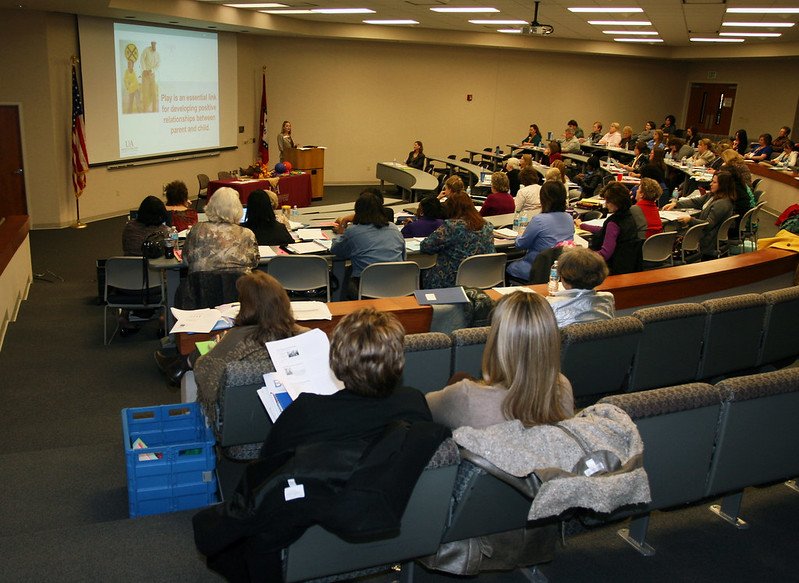By Mary Hightower
U of Arkansas System Division of Agriculture
FAYETTEVILLE, Ark. — A life spent raising cattle and helping others in the industry through research and education has earned Mike Looper a Distinguished Service Award from the American Society of Animal Science.
DISTINGUISHED SERVICE — Shane Gadberry, left, director of the Livestock and Forestry Research Station near Batesville, presents a plaque to Mike Looper recognizing him as the American Society of Animal Science Southern Section Distinguished Service Award honoree for 2024. (Photo courtesy of Justin Bartlett)
Looper is head of the animal science department, overseeing land-grant extension, research and teaching, with appointments within the University of Arkansas System Division of Agriculture and the Dale Bumpers College of Agricultural, Food and Life Sciences.
The honor was bestowed Jan. 29, during the society section’s annual meeting in Louisville, Kentucky.
Looper was raised on an Arkansas dairy/beef farm now run by a fifth generation of his family. He earned his B.S. and M.S. degrees from the University of Arkansas, then crossed the border to earn a Ph.D. from Oklahoma State University, focusing on reproduction in post-partum beef cows. Looper is still in the cattle game. He and his wife run about 100 head of cattle.
“My whole life has revolved around agriculture, specifically livestock production in the Southern U.S.,” Looper said. “I enjoy helping others whether that’s a student, producer, or an interested consumer. I’ve been fortunate to have excellent support from family, friends, co-workers and upper administration.”
“It’s wonderful to see Mike — a fellow rancher — receive this award,” said Deacue Fields, vice president-agriculture, for the University of Arkansas System. “His energy and upbeat demeanor, plus his servant leadership have been an enormous benefit to our faculty, students in Bumpers College and the livestock industry.”
In 2002, Looper joined the Agricultural Research Service arm of the U.S. Department of Agriculture, to conduct research in growth, development, physiology, and nutrition of grazing cattle. He has advised and co-advised more than 30 graduate students and authored/co-authored 67 peer-refereed journal articles, two book chapters, 112 abstracts, and more than 200 extension, research and other publications.
Looper has served as associate editor and division editor of the Animal Production Section of the Journal of Animal Science. He is an ASAS Fellow and has also served as ASAS president. Looper and his wife, Joneta, have two daughters, Madison and Taylor.
The Distinguished Service Award is the most prestigious honor for members of the American Society of Animal Science. Only one Distinguished Service Award is presented to a member in each of the society’s four regional sections “for outstanding service to the livestock industry through genetics, breeding, nutrition, physiology, immunology, management, and/or meat/food science.” Looper’s award is from the society’s Southern Section.
“Dr. Looper has a knack for connecting with students and his investment in mentoring is guiding the next generation of animal scientists,” said Jeff Edwards, Bumpers College dean. “In my faculty role at OSU, I was fortunate enough to work closely with animal scientists, and I can attest that Dr. Looper is highly regarded among his peers. He was one of the first department heads to reach out to me when I joined the U of A, and his advice has been invaluable to me as an administrator.”
Edwards called Looper “a leader in Bumpers College and the animal science community, and this is a well-deserved honor.”
“Congratulations to Dr. Looper on receiving this award,” said Jean-François Meullenet, director of the Arkansas Agricultural Experiment Station. “Mike is a true servant leader who has led the Department of Animal Science and supported its faculty, staff and students admirably for over a decade. We are very happy for him to be recognized for his service to the university and the industry.”
To learn about extension programs in Arkansas, contact your local Cooperative Extension Service agent or visit www.uaex.uada.edu. Follow us on X and Instagram at @AR_Extension. To learn more about Division of Agriculture research, visit the Arkansas Agricultural Experiment Station website: https://aaes.uada.edu. Follow on X at @ArkAgResearch. To learn more about the Division of Agriculture, visit https://uada.edu/. Follow us on X at @AgInArk.






















